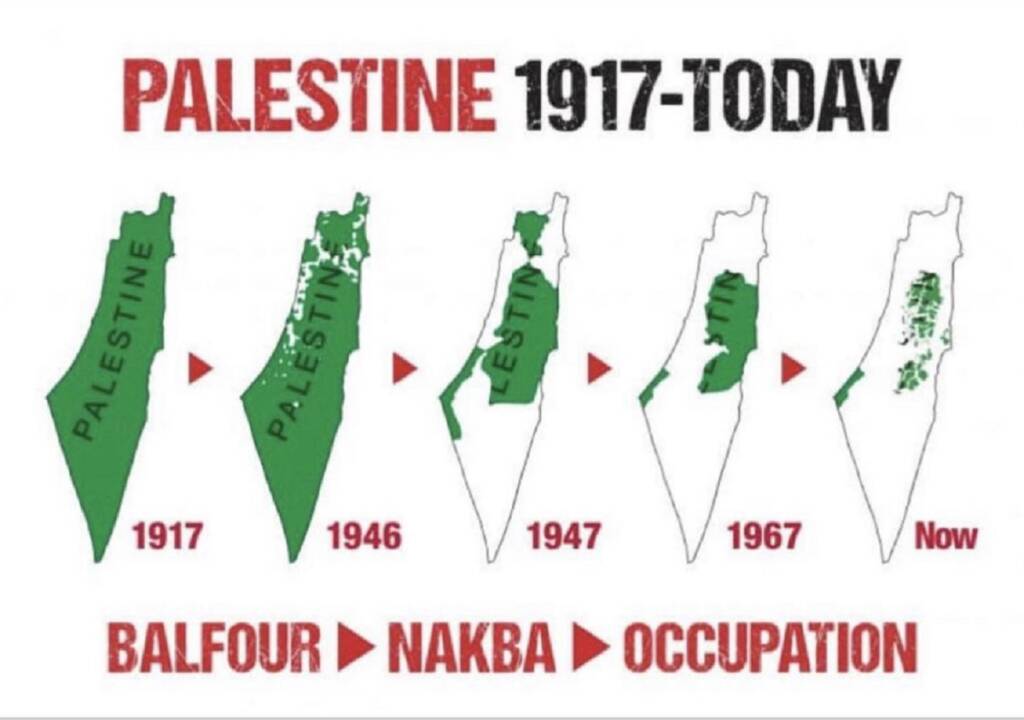Opinion | Britain apologise! Say sorry for your double-dealings that divided the Holy Land & led to Israel-Palestine crisis
Hamas, a radical Islamic terror outfit (as designated by the United States), which controls the Gaza Strip – a Palestinian territory – on October 07 this year, launched a deadly attack on Israel by land, air and sea.
This Hamas attack, according to many, completely surprised the Israeli authorities that scrambled to put in order its vast military resources and stop the ‘invading’ Hamas militia.
The October 07 Hamas terror attack was, without a doubt, a brutal, unprecedented and lethal assault on Israel’s 75-year existence.
Hamas militants launched a ground attack on Israel by breaching the wired fence that separates the Palestinian territory of Gaza from Israel at multiple locations.
The attack by Hamas on Israel can be rightly called as a terror attack because of the fact that besides targeting Israeli military, the Hamas militants indiscriminately killed innocent civilians, including children and foreigners.
Even if the Hamas cite the Palestine cause as a reason for its attack on Israel, its brutality on civilians cannot be justified.
Over 1300 people, including Israeli civilians and foreigners, are confirmed to be dead and thousands others sustained injuries in the Hamas attack.
On the other hand, another 1500 people have died in Gaza Strip of Palestine following retaliatory strikes by Israel.
Although the Israeli authorities have claimed that its air strikes on Gaza are focussed mainly on Hamas stronghold, situation on the ground speaks otherwise.
The Israeli strikes on Gaza also seemed to be indiscriminate in nature with many residential areas in the region being reduced to rubble, killing a thousand in the process.
The Israel Defence Force (IDF) also are accused of using internationally prohibited weapons, including white phosphorus bombs, during its military operations in Gaza.
NOT THE FIRST WAR IN ISRAEL-PALESTINE
This October 2023 conflict is not the first in Israel-Palestine, but may be the biggest since the 1967 Arab-Israel war.
The 1967 Arab-Israel war, also known as six-day war, was fought between Israel and a coalition of Egypt, Syria and Jordan between June 5 and 10 of 1967.
By the end of the war, Israel seized the Gaza Strip (Palestine), the Sinai Peninsula (Egypt), West Bank, including East Jerusalem (Palestine), and the Golan Heights (Syria).
Since 1967, West Bank has been under Israeli military occupation till today.
On the other hand, Israel pulled out of the Gaza Strip in 2005, withdrawing its forces and removing around 10,000 Jewish settlers living there.
Over the years, the Israeli military has been accused of wreaking numerous miseries upon Palestinian civilians in occupied West Bank.

According to testimonies of Palestinian civilians living in occupied West Bank towns and few former Israeli military personnel, Palestinian population in the West Bank are subjected to a brutal form of apartheid (meaning: policy or system of segregation or discrimination on grounds of race).
The Israeli authorities have been violating basic human rights of the Palestinians, including freedom of speech, access to roads, opening businesses and also turning a blind eye towards humiliation of Palestinians at the hands of Israeli settlers there.
ISRAEL-PALESTINE HISTORY
There is no hiding of the fact that duplicity and double-dealing were the hallmarks of the Great British Empire during the peak of its imperialism.
Britain during the 19th and the first half of the 20th century went to unimaginable lengths – engaging in duplicity and double dealings, without considering implications of those in the future – just to further its imperialistic ambitions and colonise territories across the globe.
And, the Middle-East – or the Arab World as one may refer to – also fell prey to British duplicity and double-dealings.
In 1915, during the first World War, when Britain along with its allies were fighting the central powers that included Germany, Austria-Hungary and the Ottoman Empire, Britain secretly struck a deal with Hussein ibn Ali - the Sharif of Mecca.
Notably, during the war, Britain portrayed itself as a big supporter of Arab nationalism, just to use it as a weapon against the Ottoman Empire.
Britain promised Hussein that it would support an independent Arab kingdom after the war, if he manages to unite the Arab world and mount a revolt against the Ottoman Empire.
Hussein - the Sharif of Mecca, kept his side of the bargain and revolted against the Ottoman rule during the Arab Revolt of 1916, unaware of Britain’s duplicity and the deal that the Empire was about to strike with another party.
While, Arab nationalism was gaining momentum in the Middle East, another movement was gaining popularity in Europe and the West.
It was Zionism.
Zionism is a Jewish nationalist movement that had the goal of establishing a Jewish national state in Palestine, “the ancient homeland of the Jews”.
Notably, Jews were among the major influencers when it came to decisions made by governments in the Western countries.
Thus, Britain decided to side with the Zionists to rally support among Jews in the United States and Russia.
It hoped that the Jews would influence their respective allied power governments to stay in the war until victory is achieved against the central powers.
As such, Britain announced the Balfour Declaration in 1917.
Via the Balfour Declaration, the British government announced its support for establishment of a “national home for the Jewish people” in Palestine after the end of the war.
The declaration was in the form of a letter from the then-foreign secretary of Britain – Arthur Balfour – to Lionel Walter Rothschild, a prominent British Jew.
Palestine, until the end of the First World War, was part of the Ottoman Empire with a minority Jewish population.
After the end of the world war, the victors carved up the Middle-East and established a British mandate in Palestine.
Now came the time for Britain to fulfil its war-time promises.
Remember, Britain – at the same time – had promised Hussein ibn Ali - the Sharif of Mecca – of an independent Arab Kingdom that comprised of Palestine, and the Zionists of a “national home for the Jewish people” in Palestine.
So, the British had to betray one of the two parties to fulfil the promise made to the other.
And it was the Arabs, who ended up on the wrong side of the stick, with native Palestinians being now referred to as “non-Jewish people” in their own homeland.
The British facilitated the immigration of the Jews of Europe to Palestine since the early 1920s.
By 1935, the Jewish population in Palestine rose from a mere nine (9) percent to a staggering 27 percent.
The Jewish population in Palestine, during and after the Nazi regime in Germany and occupied Europe, in the 1940s exploded.
With revelation of the horrors that Jews in Europe went through during Hitler’s Nazi regime, movement for establishing a Jewish nation-state received further impetus.
The newly formed United Nations approved a plan for partition of Palestine into two states – Israel and Palestine – that eventually triggered a civil war between the two peoples, with scores killed on both sides.
On May 14, 1948, the British terminated the Palestine Mandate and Israel declared independence.
Since then, Israel fought with Arab forces on numerous occasions, faced several internal conflicts – all because of the Palestine cause – all for the urge of the Arab world to see an independent Palestine; a free Palestine governed by Palestinians for Palestinians.
There is nothing wrong in native Palestinians demanding self-rule in their own homeland.
BRITAIN APOLOGISE!
Britain’s duplicity, double dealings and the West’s ignorance towards plight of the native Palestinian people can be concluded as the root causes of the decades-long Israel-Palestine issue.
Who gave the British the right to determine the fate of the Palestinians and the Jews?
Who on earth were the British to announce a declaration that stripped the native populace of Palestine of their homeland?
Who were the Brits to take a decision about a land that it had no claim on?
Late Awni Abd al-Hadi, a prominent Palestinian political figurehead had condemned the Balfour Declaration, saying it was made by an English foreigner who had no claim to Palestine, to a foreign Jew who had no right to it.
Late Palestinian-American academic Edward Said has stated that the Balfour Declaration was “made by a European power … about a non-European territory … in a flat disregard of both the presence and wishes of the native majority resident in that territory”.
With no end to the Israel-Palestine conflict in sight, the least the British can do now is to apologise and say sorry for their century-old double-dealings that divided the Holy Land and pushed it towards a never ending crisis.



